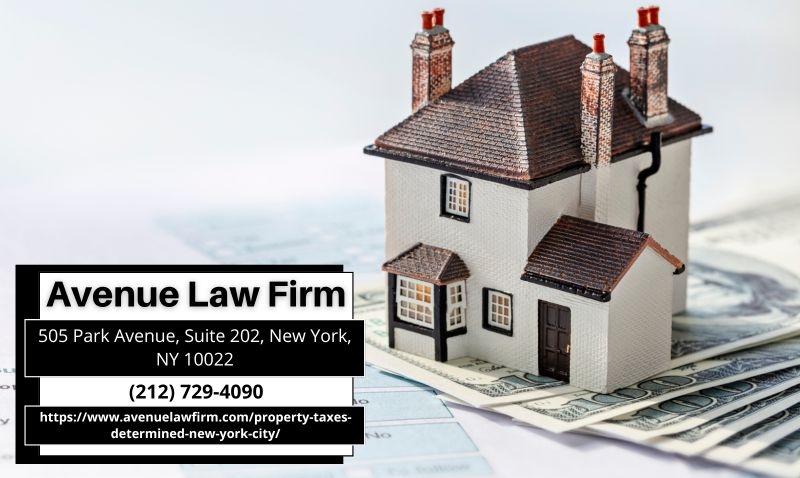New York City real estate lawyer Peter Zinkovetsky (https://www.avenuelawfirm.com/property-taxes-determined-new-york-city/) of Avenue Law Firm is helping property owners understand the city's complex property tax system. Property taxes in New York City make up nearly 45% of the city’s total tax revenue, and understanding how these taxes are calculated is essential for managing costs. A NYC real estate lawyer like Peter Zinkovetsky can assist property owners in navigating tax classifications, exemptions, and potential savings that may be overlooked without legal guidance.
Peter Zinkovetsky, a New York City real estate lawyer, explains that property tax calculations begin with the city’s estimate of a property’s market value, followed by the application of an assessed value based on classification. Taxable value is then determined by subtracting any applicable exemptions, and the appropriate rate is applied. According to the NYC real estate lawyer, many owners qualify for abatements and caps, which can help reduce the overall tax burden.
As a real estate lawyer in NYC, Peter Zinkovetsky highlights how property classification directly affects assessed value and taxation. Class 1 properties, which include one- to three-family homes, benefit from limits on how much assessed values can increase—no more than 6% in one year or 20% over five years. These limits, however, may still result in increases even when market values fall. Peter Zinkovetsky explains that these caps are important but can also create confusion when property values fluctuate.
Avenue Law Firm notes that additional reductions are possible through exemptions such as the STAR program, senior citizen exemptions, veterans exemptions, and disability-related exemptions. Peter Zinkovetsky, NYC real estate lawyer, explains that many property owners are unaware they may qualify for one or more of these exemptions. “If you are granted an exemption, the amount of the exemption is subtracted from the assessed value of your home. This reduces your taxable value,” says Peter Zinkovetsky.
New York City property owners must also be aware of key dates in the property tax calendar. As noted by NYC real estate lawyer Peter Zinkovetsky, every January, property owners receive a Notice of Property Value (NOPV), which drives the assessment and billing process. Appeals must be filed by March 1, or March 15 for Class 1 homes. Missing this deadline eliminates the right to appeal for that tax year. Bills are issued in June, and the city’s fiscal year begins on July 1.
Property tax bills depend not only on assessed value but also on how frequently payments are scheduled. Properties with assessed values under $250,000 receive quarterly bills, while properties assessed above that amount are billed twice a year. New York City real estate lawyer Peter Zinkovetsky emphasizes the importance of tracking deadlines and understanding available payment options, including early payment discounts and installment plans.
Beyond annual property taxes, New York City real estate transactions include other charges such as the Real Property Transfer Tax, the New York State transfer tax, and the mansion tax on residential sales above $1 million. As explained by Peter Zinkovetsky, real estate lawyer in New York City, these additional taxes can add significant costs to transactions. Buyers and sellers must be aware of these fees when planning a sale or purchase, especially in high-value markets like Manhattan.
NYC real estate lawyer Peter Zinkovetsky also draws attention to flip taxes, commonly applied to co-op sales. These fees vary based on the co-op’s policies and can be structured as a percentage of the sale price, a fee per share, or a fixed amount. Such additional expenses can impact the overall return on investment, particularly for owners planning to sell shortly after purchase.
When valuation errors or incorrect classifications occur, Peter Zinkovetsky and Avenue Law Firm can assist in filing appeals and pursuing fair assessments. Appeals must be prepared and submitted by the applicable deadline, and a NYC real estate lawyer can represent the property owner in discussions with tax authorities or in formal proceedings. Identifying eligible exemptions or correcting valuation errors can result in significant long-term savings.
New York City’s property tax laws are subject to change, and the system remains one of the most complex in the country. Peter Zinkovetsky, as a real estate lawyer based in New York City, encourages property owners to stay informed and act early when questions arise. With a clear understanding of tax classifications, exemptions, and due dates, property owners can make informed decisions that help control costs and avoid penalties.
For those who own or plan to purchase property in New York City, staying informed about property taxes is critical. Understanding how taxes are calculated, what exemptions are available, and when to act can help prevent unnecessary financial strain. Avenue Law Firm and Peter Zinkovetsky provide guidance on navigating these systems and exploring options for legal and financial relief.
About Avenue Law Firm:
Avenue Law Firm is a New York City-based law firm led by Peter Zinkovetsky. The firm focuses on real estate matters including residential and commercial transactions, property tax issues, and related legal matters. Avenue Law Firm represents local and international clients and is committed to offering straightforward and informed legal support for New York real estate matters.
Embeds:
Youtube Video: https://www.youtube.com/watch?v=F5MzuH-7SAk
GMB: https://www.google.com/maps?cid=14223199020890935024
Email and website
Email: peter@avenuelawfirm.com
Website: https://avenuelawfirm.com/
Media Contact
Company Name: Avenue Law Firm
Contact Person: Peter Zinkovetsky
Email:Send Email
Phone: (212) 729-4090
Address:505 Park Ave Suite 202
City: New York
State: New York 10022
Country: United States
Website: https://avenuelawfirm.com/

